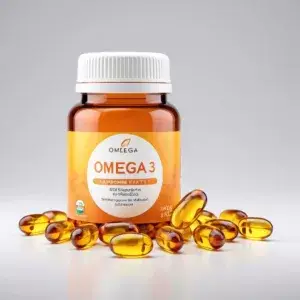Table of Contents
Where It Comes From
Phosphatidylserine is a phospholipid, or fat molecule, that is an important component of cell membranes, particularly in brain cells (neurons). It is highly concentrated in the brain, where it is essential for cell structure, communication, and function. You can obtain phosphatidylserine through your diet, primarily from soy, white beans, mackerel, and organ meats. It is also commonly used as a supplement to promote cognitive health.
What It is Indicated For
People primarily use phosphatidylserine to improve memory, reduce stress, and prevent cognitive decline. It is popular among people looking to boost their mental clarity, focus, and overall cognitive ability. People also use phosphatidylserine to promote healthy aging and commonly find it in nootropic stacks designed to improve brain function.
Key Benefits:
- Memory Support: Research demonstrates that phosphatidylserine enhances memory, especially in older individuals experiencing age-related cognitive decline. Aging published a study that found phosphatidylserine supplementation significantly enhanced memory recall in elderly individuals with memory issues.
- Cognitive Function: Phosphatidylserine promotes overall cognitive performance by keeping brain cell membranes healthy, including learning, concentration, and processing speed. The Journal of Clinical Biochemistry and Nutrition published a study that found phosphatidylserine improved cognitive performance and mood in healthy young adults under stress.
- Stress Reduction: Phosphatidylserine is also renowned for its potential to lower cortisol levels, the hormone linked to stress. The Journal of the International Society of Sports Nutrition published a study that found phosphatidylserine supplementation lowered exercise-induced cortisol levels, potentially reducing stress and improving recovery.
Contraindications
Most people generally find phosphatidylserine safe, but those using blood thinners or nonsteroidal anti-inflammatory drugs (NSAIDs) should use it with caution as it may increase the risk of bleeding. Additionally, individuals with soy sensitivities should be cautious, as soy lecithin is the source of many phosphatidylserine supplements.
Warnings
While phosphatidylserine is generally well tolerated, some people may develop minor side effects such as stomach upset, sleeplessness, or headaches, especially at larger doses. If you have any pre-existing issues or concerns, you should check with a healthcare professional before taking the medication.
Dosages
The normal daily dose of phosphatidylserine ranges from 100 to 300 mg, depending on the product and the individual’s needs. Clinical trials frequently use doses in this range to obtain cognitive benefits without significant negative effects. We generally advise a daily dose of 200–300 mg for older people or those experiencing cognitive loss.
Products Contained In
Mind Lab Pro: A comprehensive nootropic stack that includes phosphatidylserine for memory support and cognitive function.
Alpha Brain: A popular nootropic that uses phosphatidylserine to enhance focus, mental clarity, and memory.
NooCube: A cognitive enhancement supplement featuring phosphatidylserine to support brain health and reduce stress.
Qualia Mind: A high-potency formula that includes phosphatidylserine to improve memory and overall cognitive performance.
Performance Lab Mind: A nootropic designed to support brain regeneration and cognitive enhancement, with phosphatidylserine as a key ingredient.
Neuro-Peak: A brain health supplement that incorporates phosphatidylserine to support memory, focus, and mental clarity.
Brain Pill: A cognitive enhancement supplement that includes phosphatidylserine for improved memory and cognitive function.
References
1. Crook, T. H., Tinklenberg, J., Yesavage, J., Petrie, W., Nunzi, M. G., & Massari, D. C. (1991). Effects of phosphatidylserine in age-associated memory impairment. Aging (Milano), 3(2), 151–158.
2. Benton, D., Donohoe, R., Sillance, B., & Nabb, S. (2001). The influence of phosphatidylserine supplementation on mood and heart rate when faced with an acute stressor. Journal of Clinical Biochemistry and Nutrition, 30(1), 103–111.
3. Kingsley M. (2006). Effects of phosphatidylserine supplementation on exercising humans. Journal of the International Society of Sports Nutrition, 3(1):82–89.





